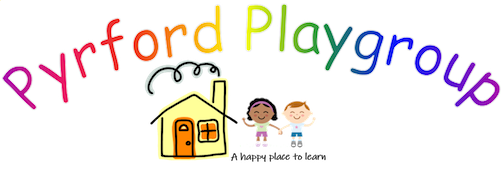Our Curriculum
We follow “The Early Years Foundation Stage” curriculum which is supported by the Department for Education. For this we use a number of resources guided in principal by the document ‘Development Matters in the Early Years Foundation Stage’: www.early-education.org.uk. In addition we use our vast experience as Early Years practitioners together with advice from the Surrey Early Years and Child Care Services. Above and beyond this we listen to and observe each unique child. From here we generate learning opportunities that match their individual needs.
During each playgroup session, the children are offered experiences that support their development, right across the Early Years curriculum from social, physical and communication skills to being creative and understanding the world around them including numbers, reading and ‘writing’.
We value the relationships we form with each child and their parents. In support of this we assign a key practitioner to each child who will form a day to day bond. They work with each child’s interests whilst supporting them in taking risks and exploring. The practitioner will keep records of the child’s development and communicate with parents.
The curriculum of learning experiences is shaped into 3 prime areas (Personal, Social and Emotional Development, Communication and language, Physical Development) and 4 specific areas (Literacy, Mathematics, Understanding the world, Expressive Arts and Design) details of which are below.
None of these aspects of the curriculum are offered in isolation but in context and tailored to meet each child’s individual needs and interests.
And finally, we are routinely inspected by OFSTED to ensure we meet their standards for learning, development and care for children up to the age of five.
Personal, Social and Emotional Development
Here we support the children in making relationships, developing self confidence and self awareness, and their ability to manage their behaviour.
Communication and language
This is about learning to listen attentively, being able to understand instructions and answer how and why questions about their experiences. Also to express themselves effectively, being aware of the listeners’ needs.
Physical Development
The children have opportunities to learn control of their large and small movements, from climbing and running safely amongst other children, to cutting paper with scissors or threading beads. They also learn about keeping healthy and safe and about their own basic hygiene.
Literacy
The children are exposed to a wide variety of stories, songs and rhymes. These might be the basis of a theme from which the children enjoy a selection of connected activities, or simply through books chosen from our library.
Mathematics
We incorporate the language of number throughout each session. For example, ‘Can you jump 3 times to warm up? Now more. Let’s try 5 times.’ Or ‘Who has two feet for these two shoes?’ Or ‘We would all like to share the cake. Help me count how many pieces I need to cut.’ The children are encouraged to find ways of noting what they’ve counted and in the context of their play.
Likewise with shape, space and measure, it always has relevance and has been drawn from the children’s ideas and interests.
Understanding the world
We give the children experiences to connect them with ideas about communities, the jobs that people do and significant events in their lives. Also with their immediate environment, living things, growth and decay. The children learn to operate simple equipment such as the Playgroup CD player and camera. They also have a variety of toys which function using certain buttons, levers, knobs and so on, as well as a computer with a range of simple programs.
Expressive Arts and Design
This is about playing with texture, colour, materials design, form and function as well as songs music and dance role play and stories. Throughout the playgroup activities, any expression of imagination is embraced and encouraged.
